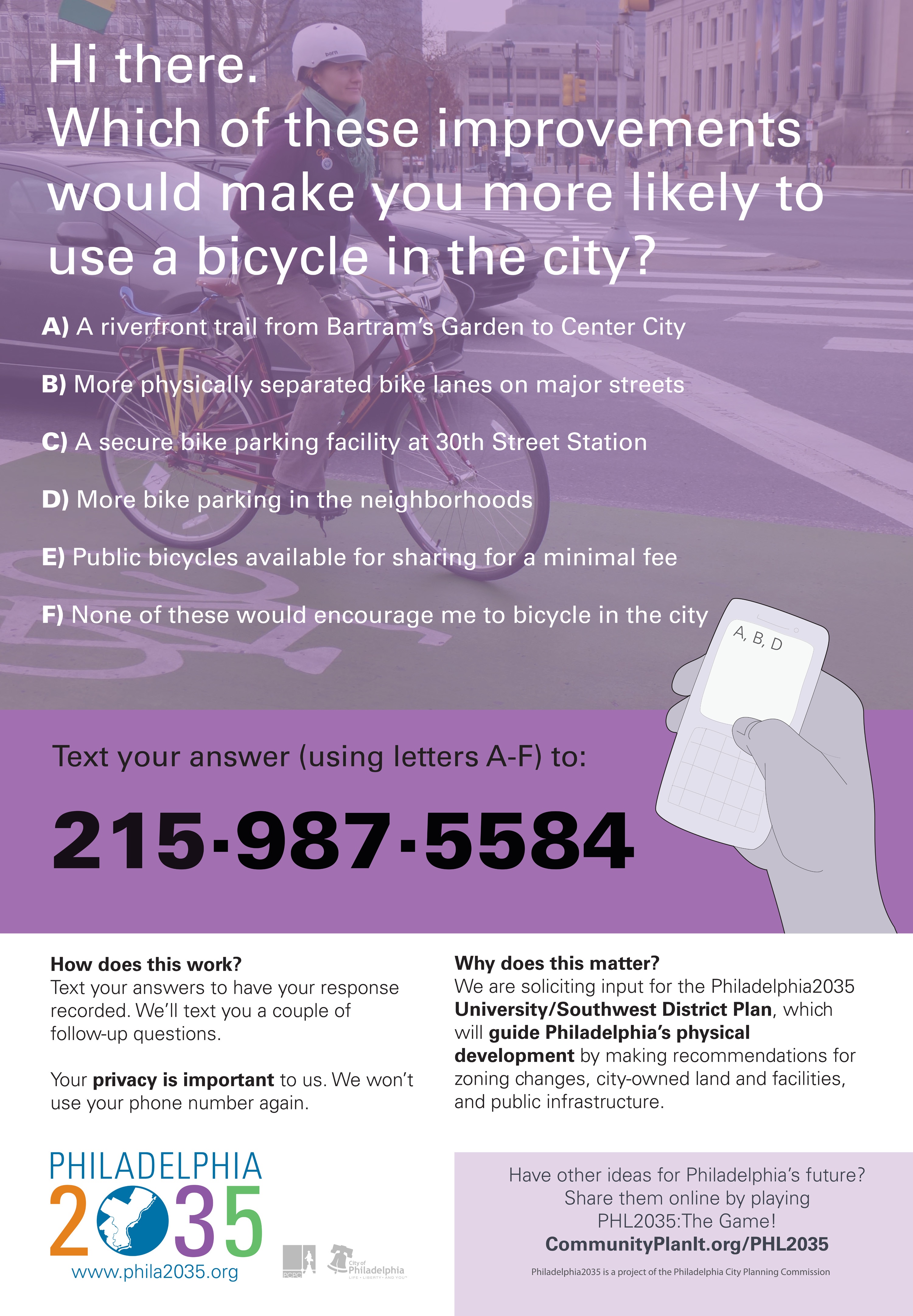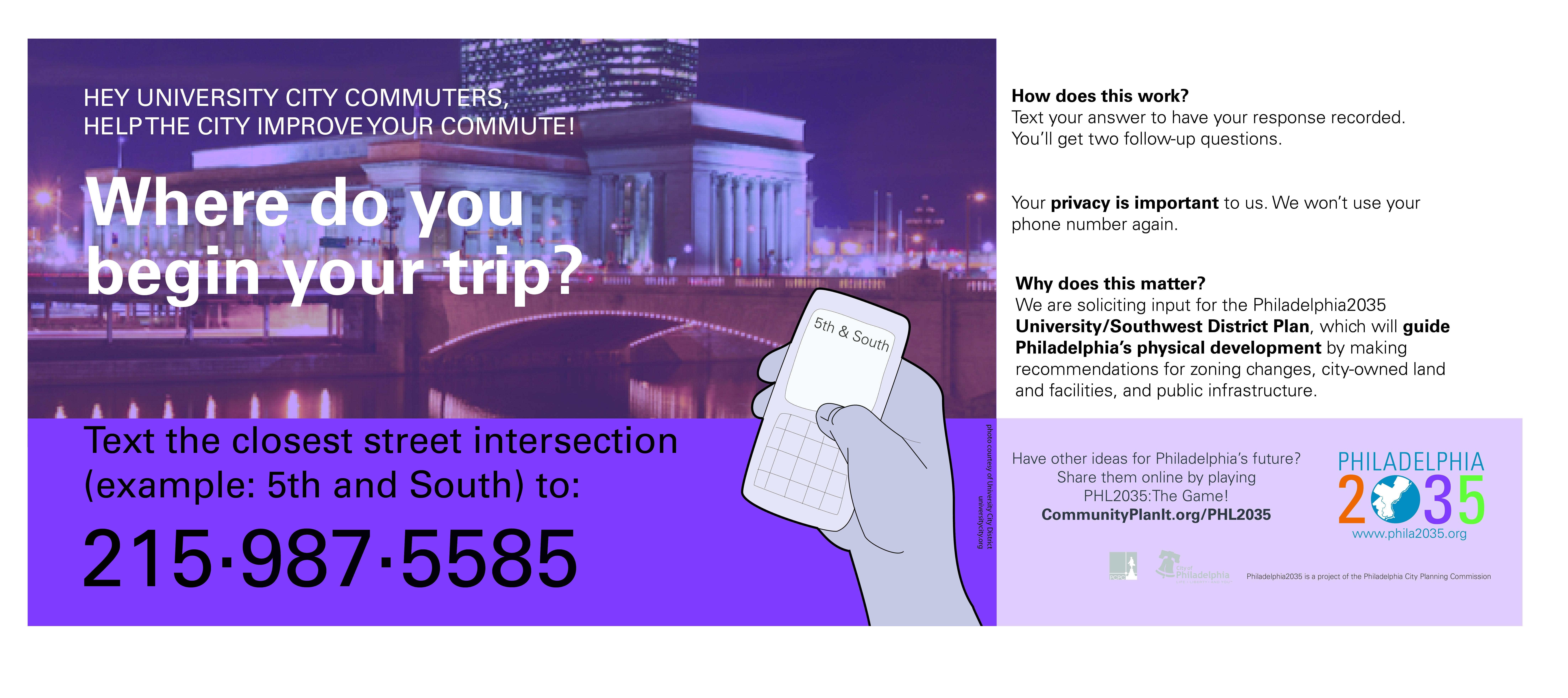Textizen take two: Planning Commission hosts second round of surveys

In the current round of Philadelphia 2035 district planning, the Philadelphia City Planning Commission (PCPC) is using text-based surveys to overcome the digital divide and prioritize elements of the University/Southwest District Plan. To do so, PCPC has partnered for a second time with Textizen – a text message based survey platform that PCPC helped to pilot last summer.
This past June, Code for America and the City of Philadelphia launched the first Textizen pilot. For roughly one month Textizen and PCPC hung posters in the Lower Northeast and Central districts featuring survey questions that passersby could answer via text message. PCPC then incorporated survey responses into the Lower Northeast and Central district plans.
Now working on the University/Southwest District Plan, PCPC has partnered with Textizen to ask three questions about biking, bus routes and commercial corridors along trolley routes.
Second Time’s the Charm
With one successful Textizen survey campaign under its belt, PCPC has made some adjustments to its surveying tactics.
For starters, all of the current surveys are located on or in public transit vehicles and shelters. There are five bicycle-related posters in bus shelters, 90 bus-route posters in busses and 10 commercial corridor questions on the outside of trolleys.
“We found our biggest success was when we partnered with SEPTA and placed the surveys directly in the transit system,” said Clint Randall of PCPC’s Strategic Planning and Policy Division.
An advantage to this is that as long as an ad space is open, Titan, SEPTA’s advertising company, has allowed PCPC to display the survey posters for free. Because Textizen is still partnering with PCPC for free, the only cost for the City is printing the actual posters.
This round of surveys is also more specific.
“In the pilot the questions were a lot broader because we were just curious to see if anyone was listening,” Randall said.
Where the pilot asked broader questions about long-term projects and ideas such as bus rapid transit, this round of surveys asks questions about things that could be feasible in the nearer term, like protected bike lanes or a potential bus loop.
Part of the reasoning behind that is to help PCPC prioritize upcoming projects.
“We’re genuinely interested in what people would want to see first,” he said.
In addition to posting the questions in and on public transit, PCPC has started sharing the surveys online. The online surveys have different response phone numbers so the organization can track which answers come from which source.
Bike, Bus, and Trolley Questions
In this current round of surveys, Randall said the bicycle question is by far the most popular.
“It’s actually blowing the other ones out of the water,” he said.
In just under a month, the five bicycling question posters have brought in more than 230 responses. The poster asks which of six potential bicycling improvements would make residents more likely to bike in the city. Both online and via the bus shelter posters, respondents are saying they would be more likely to ride their bicycles in the city if there were more physically separated bicycle lanes on major streets.
The bus route question asks riders where they begin their trip, and the commercial corridor asks if riders shop along a given trolley route.
Bridging the Digital Divide
A main selling point of Textizen is that virtually anyone with a cell phone can respond at any time.
“It really does address the issue of the digital divide in Philadelphia,” Randall said. “It’s a way people without smart phones or computers can get involved.”
Citizens can also participate without having to attend a specific community meeting.
There are some limitations with texting though. For instance, Randall said, you don’t want to overwhelm people with too much information or too many questions. With the bicycling question a few follow up prompts ask if respondents currently ride a bicycle and what their home zip code is. If additional questions were asked, chances are responses might peter out.
Randall said this is really a way for PCPC to gather more data and to hear from more people. He encouraged anyone who may have suggestions about how Textizen can be used or who have potential questions to send them in.
WHYY is your source for fact-based, in-depth journalism and information. As a nonprofit organization, we rely on financial support from readers like you. Please give today.






